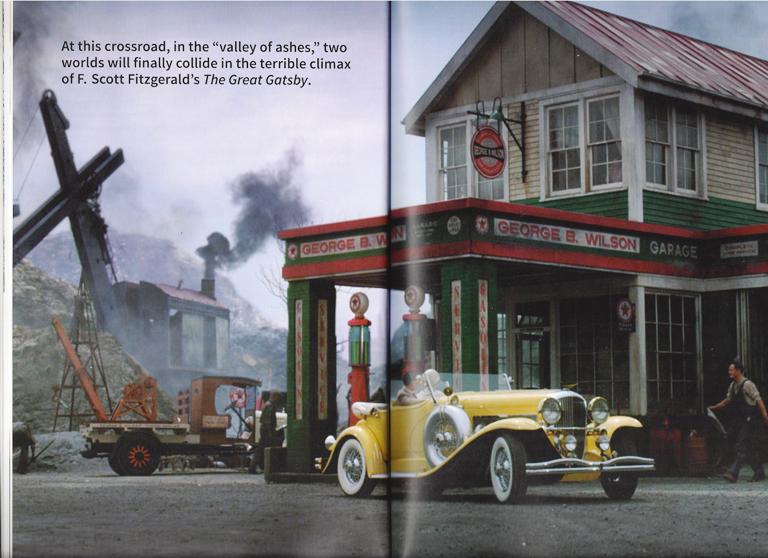 |
THE FIRST TEN SECONDS WERE FANTASTIC ~ Posted by Anthony Gardner, March 24th 2013
I don’t share the view that "Gatsby" is unadaptable: the 1974 movie starring Robert Redford and Mia Farrow is an admirable attempt. But sitting through six hours of last year’s stage version in the West End, which reduced it at times to low farce, I realised how badly a director could get things wrong. Once I had booked my ticket to the film, however, I felt surprisingly excited. Leonardo DiCaprio and Carey Mulligan (pictured) were fine actors; Luhrmann might yet recover his form. It could prove a huge treat. The first ten seconds were fantastic, with old-style black-and-white credits gradually blushing into colour, and Gatsby’s monogram morphing into the light on Daisy’s pier. Then things started to go wrong. If you’re going to retain Nick Carraway’s supremely lyrical first-person narrative, there’s no point in garbling it. My heart sank as Gatsby’s "great gift for hope, a romantic readiness such as I have never found in any other person" was reduced to "He was the single most hopeful person I have ever met." Worse, the clear-sighted Carraway—as far as you can get from an unreliable narrator—was presented as mentally unbalanced and as wet as Long Island Sound. Why on earth would the glamorous Buchanans, whose invitation to dinner sets the plot in motion, want to spend time with him? But as we arrived at their mansion, staffed by white-tied escapees from a Ferrero Rocher advertisement, it became clear that realism was low on Luhrmann's agenda. And with each change of scene, the frantic cutting and transparently fake settings betrayed the fact that Luhrmann had failed to grasp the essence of the novel—that Gatsby is the still point of a turning world, with a timeless dream which is the antithesis of the frantic Jazz Age. With the film hurtling from one piece of gimmickry to another, it was impossible to see how any suggestion of genuine feeling—let alone wondrous romance—might creep in. My irritation at Luhrmann’s obtuseness gradually turned to fury at his self-indulgence. Honour demanded that I stay for two key moments. I was still in my seat (just) when Gatsby—barely glimpsed in the first 40 minutes—finally took centre stage, unleashing the charm which is supposed to set him apart; but the soaring music and background fireworks merely emphasised DiCaprio's charisma deficit. As for Gatsby's long-dreamed-of reunion with Daisy (a strangely unalluring Carey Mulligan), Luhrmann’s interest seemed to lie principally in the set-dressing; DiCaprio’s best attempt at emotion consisted of snorting like a bull. This was the book’s most poignant scene, and having watched them trample over that, I couldn’t bear to think what they might do to Fitzgerald’s rhapsodic finale. I reached for my coat and stole away. Anthony Gardner previews talks for Intelligent Life and edits the Royal Society of Literature's magazine RSL. His posts for the Editors' Blog include Zero tolerance at the giftshop and My library has no books
|
 From the moment I first heard about
Baz Luhrmann’s "The Great Gatsby", the question of whether to go
tormented me. I have loved Scott Fitzgerald’s masterpiece since I first
read it in my early teens: so perfect is it in tone and so economical
in structure that I tend to think of it as a poem rather than a novel,
and promise myself from time to time that I will learn it by heart.
Luhrmann’s "Strictly Ballroom" and "Romeo+Juliet" impressed me
enormously, but "Moulin Rouge" is surely one of the worst films ever
made. His "Gatsby", I felt sure, would be either a triumph or a
travesty.
From the moment I first heard about
Baz Luhrmann’s "The Great Gatsby", the question of whether to go
tormented me. I have loved Scott Fitzgerald’s masterpiece since I first
read it in my early teens: so perfect is it in tone and so economical
in structure that I tend to think of it as a poem rather than a novel,
and promise myself from time to time that I will learn it by heart.
Luhrmann’s "Strictly Ballroom" and "Romeo+Juliet" impressed me
enormously, but "Moulin Rouge" is surely one of the worst films ever
made. His "Gatsby", I felt sure, would be either a triumph or a
travesty.